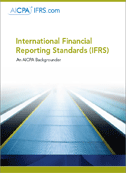SEC LEADERSHIP IN INTERNATIONAL EFFORT
The U.S. Securities and Exchange Commission has for many years been a strong leader in international efforts to develop a core set of accounting standards that could serve as a framework for financial reporting in cross-border offerings. It has repeatedly made the case that issuers wishing to raise capital in more than one country are faced with the increased compliance costs and inefficiencies of preparing multiple sets of financial statements to comply with different jurisdictional accounting requirements. In 2000, the International Organization of Securities Commissions (IOSCO), in which the SEC plays a leading role, recommended that its members allow multinational issuers to use 30 “core” standards issued by the IASB’s predecessor body in cross-border offerings and listings. A few years later, the SEC announced its support of a memorandum of understanding — the Norwalk Agreement — between the Financial Accounting Standards Board (FASB) and the International Accounting Standards Board. This agreement, concluded in Norwalk, Connecticut, established a joint commitment to develop compatible accounting standards that could be used for both domestic and cross-border financial reporting. In a subsequent memorandum of understanding, the FASB and the IASB agreed that a common set of high quality, global standards remained their long-term strategic priority and established a plan to align the financial reporting of U.S. issuers under U.S. GAAP with that of companies using IFRS. Between 2005 and 2006, the number of foreign private issuers filing with the SEC using IFRS jumped from a handful to 110, and the SEC expects the number to continue to increase. In February 2006, SEC Chairman Christopher Cox reaffirmed the SEC’s commitment to achieving one set of high quality, globally accepted accounting standards and opened the possibility that U.S. financial statements could be prepared using IFRS or U.S. GAAP. In 2007, the SEC unanimously voted to allow foreign private issuers to file financial statements prepared in accordance with IFRS as issued by the IASB without reconciliation to GAAP. Of even greater importance was the SEC’s Concept Release seeking input on allowing U.S. public companies to use IFRS when preparing financial statements. Most recently, the SEC issued a proposed roadmap that includes seven milestones for continuing U.S. progress toward acceptance of IFRS. The roadmap also would allow early adoption of IFRS for U.S. public companies that meet certain criteria. Another recent development also points toward an accelerated convergence timeline. On September 11, 2008, the IASB and the FASB issued an update to their 2006 memorandum of understanding to state 2011 as the goal for completion of their major joint projects. The boards will work toward convergence of important accounting standards, such as revenue recognition, leases and consolidation. Resolution of differences in these key standards is a criterion for potentially moving U.S. public companies to IFRS. The FASB and the IASB say they will update the Norwalk Agreement to lay out a plan for one set of accounting standards from which all major capital markets would be able to operate by 2013. The boards will work to resolve differences believed to have impeded IFRS adoption in the U.S. View International Financial Reporting Standards (IFRS) — An AICPA Backgrounder [PDF - 375k]
|

